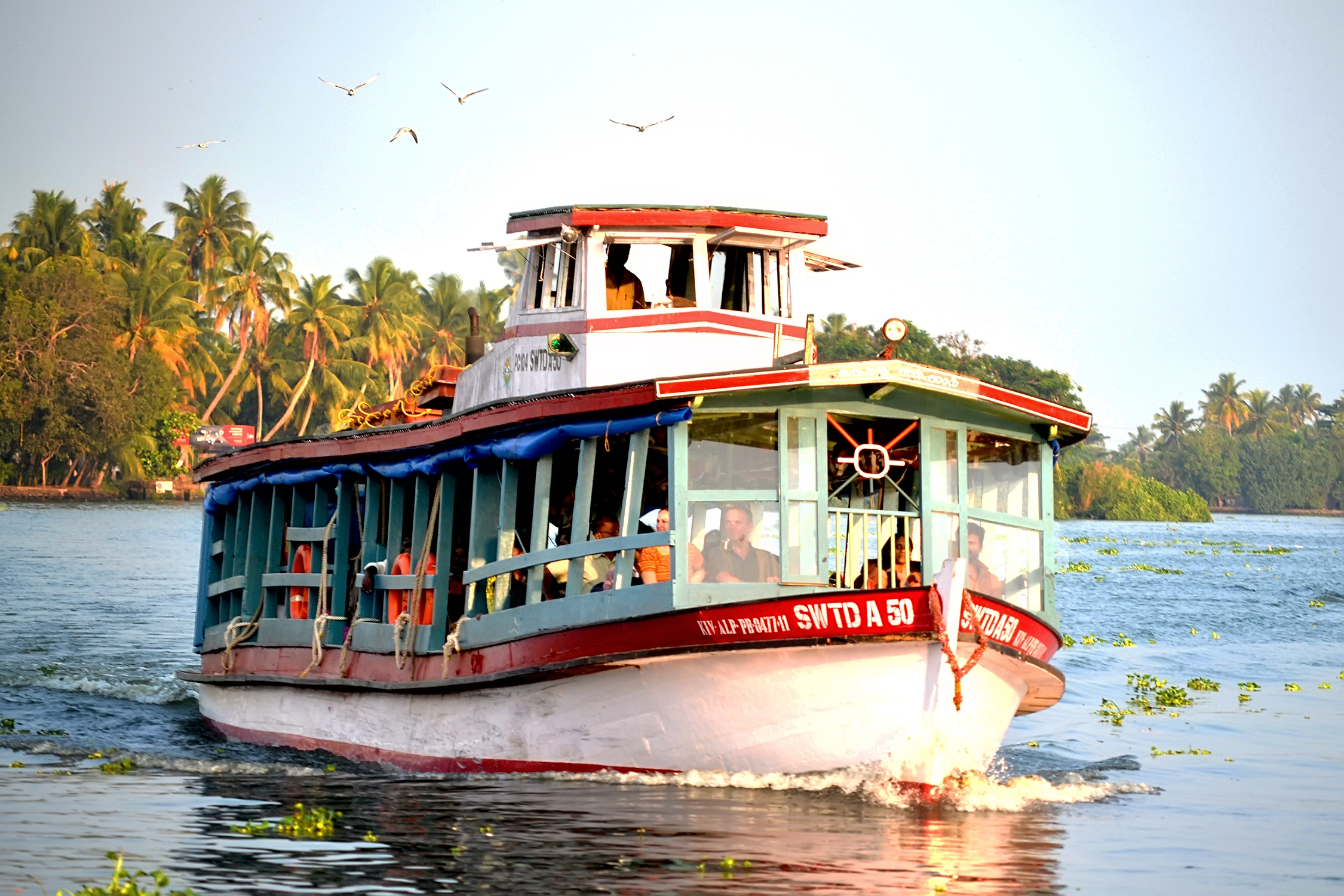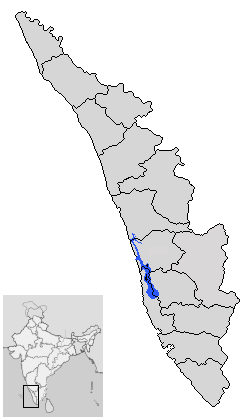|
Pallithanam Luca Matthai
Pallithanam Luca Matthai (also known as Pallithanathu Mathaichan) was born in 1880 in Kainady village, Kuttanad, British India. His father, Mathai Luca Pallithanam, was among the pioneers of kayal cultivation (reclamation of cultivable land from the Vembanad Lake) in Kuttandu. The family estate passed to 18-year-old Luca Matthai on the death of his father. Matthai spearheaded the reclamation activities of more than one-third of the total Kayal Nilam's (Kayal Nilam refers to the cultivable land reclaimed from the Vemaband Lake). His first venture of kayal cultivation was the reclamation of Cherukara Kayal. During 1898-1904, he reclaimed the Pallithanam Moovayiram Kayal and Madathil Kayal but could not progress further because of a ban on reclamation imposed by the Travancore Raja in 1904. That ban was removed in 1914, after which Matthai and some other prominent families in Kuttanadu, reclaimed E-Block Kayal, which covered . This is the biggest kayal nilam in Kuttanadu. H Bloc ... [...More Info...] [...Related Items...] OR: [Wikipedia] [Google] [Baidu] |
Kainady
Kainady is a village located in Neelamperoor panchayat in Alappuzha district of Kerala, India. Geography Kainady is a small island and consists of picturesque paddy fields and small canals. Population consists of Hindu and Christian denominations. Our Lady of Dolours Church and Karumathra Temple are two main places of worship in Kainady. Celebrities Kainady is the birthplace of Pallithanam Luca Matthai (popularly known as Pallithanathu Mathaichan) who was the member of Sree Moolam Popular Assembly during the 1920s. He pioneered the backwater paddy cultivation in Kuttanadu. In 1900 he reclaimed Cherukara Kayal and Pallithanam Kayal from the Vembanad Kayal for paddy cultivation. He is considered as the father of cooperative agricultural movement in Kuttanadu. He spearheaded the debt relief struggle and was instrumental in the enactment of Agricultural Debt Relief Act, that emancipated the illfated agriculture families from the debt trap. He was the founder of Kuttanadu Kars ... [...More Info...] [...Related Items...] OR: [Wikipedia] [Google] [Baidu] |
Kuttanad
Kuttanad ( ml, കുട്ടനാട്) is a region covering the Alappuzha, Kottayam and Pathanamthitta Districts, in the state of Kerala, India, well known for its vast paddy fields and geographical peculiarities. The region has the lowest altitude in India, and is one of the few places in the world where farming is carried on around below sea level. Kuttanad is historically important in the ancient history of South India and is the major rice producer in the state. Farmers of Kuttanad are famous for Biosaline Farming. Food and Agriculture Organization (FAO) has declared the Kuttanad Farming System as a Globally Important Agricultural Heritage System (GIAHS). Four of Kerala's major rivers, the Pamba, Meenachil, Achankovil and Manimala flow into the region. It is well known for its boat race in the Punnamada Backwaters, known in Malayalam as Vallamkalli. History This region with abundant paddy fields and lakes produces rice, vegetables & fruits, fish, dairy produc ... [...More Info...] [...Related Items...] OR: [Wikipedia] [Google] [Baidu] |
British India
The provinces of India, earlier presidencies of British India and still earlier, presidency towns, were the administrative divisions of British governance on the Indian subcontinent. Collectively, they have been called British India. In one form or another, they existed between 1612 and 1947, conventionally divided into three historical periods: *Between 1612 and 1757 the East India Company set up Factory (trading post), factories (trading posts) in several locations, mostly in coastal India, with the consent of the Mughal emperors, Maratha Empire or local rulers. Its rivals were the merchant trading companies of Portugal, Denmark, the Netherlands, and France. By the mid-18th century, three ''presidency towns'': Madras, Bombay and Calcutta, had grown in size. *During the period of Company rule in India (1757–1858), the company gradually acquired sovereignty over large parts of India, now called "presidencies". However, it also increasingly came under British government over ... [...More Info...] [...Related Items...] OR: [Wikipedia] [Google] [Baidu] |
Vembanad Lake
Vembanad is the longest lake in India, as well as the largest lake in the state of Kerala. The lake has an area of 230 square kilometers and a maximum length of 96.5 km. Spanning several districts in the state of Kerala, it is known as Vembanadu Lake in Kottayam, Vaikom, Changanassery, Punnamada Lake in Alappuzha, Punnappra, Kuttanadu and Kochi Lake in Kochi. Several groups of small islands including Vypin, Mulavukad, Maradu, Udayamperoor, Vallarpadam, Willingdon Island are located in the Kochi Lake portion. Kochi Port is built around the Willingdon Island and the Vallarpadam island. Kuttanad, also known as ''The Rice Bowl of Kerala'', has the lowest altitude in India, and is also one of the few places in world where cultivation takes place below sea level. Kuttanad lies on the southern portion of Vembanad. The Nehru Trophy Boat Race is conducted in a portion of the lake. High levels of pollution have been noticed at certain hotspots of the Vembanad backwaters. The G ... [...More Info...] [...Related Items...] OR: [Wikipedia] [Google] [Baidu] |
Madathil Kayal
Madathil is an Arabic and Indian surname. Notable people with the surname include: *Kumaran Madathil (1920–1995), Indian politician *Sajitha Madathil Sajitha Madathil is an Indian film and theatre actor. Her performance in Joy Mathew's feature film '' Shutter'' (2012) won her the State film award for second best actress. She is the head of the department of Acting at the K. R. Narayanan N ..., Indian actress * Venugopal Madathil (born 1966), Indian cinematographer {{surname Arabic-language surnames Surnames of Indian origin ... [...More Info...] [...Related Items...] OR: [Wikipedia] [Google] [Baidu] |
Moolam Thirunal Of Travancore
Sir Moolam Thirunal Rama Varma (1857–1924) was Maharajah of the princely state of Travancore between 1885 and 1924, succeeding his uncle Maharajah Visakham Thirunal (1880–1885). Early life and education Mulam Thirunal Rama Varma was born on 25September 1857 to Prince Raja Raja Varma of the Changanassery Royal Family and Maharani Lakshmi Bayi of Travancore, niece of Maharajah Swathi Thirunal. His mother died when he was only a few days old. The Maharajah had an elder brother, Hastham Thirunal. After the usual vernacular Malayalam studies, the two princes were placed under the tutorship of Annaji Rao B.A. and later under Raghunath Rao B.A. at a country house built specially for the purpose. Hastham Thirunal soon had to stop his studies owing to ill health and so Rama Varma remained the only pupil under the tutor. He was initially taught subjects such as history, geography, arithmetic and grammar. His great-grandmother was the Maharani Gowri Lakshmi Bayi of Travancore. ... [...More Info...] [...Related Items...] OR: [Wikipedia] [Google] [Baidu] |
Praja Sabha
The Sree Moolam Popular Assembly in the erstwhile state of Travancore was the first popularly elected legislature in the history of India. Its predecessor legislative council was formed in Travancore in 1888 with eight appointed members. Sri Mulam Thirunal Ramavarma, who became maharajah of Travancore in 1886, established it in an order issued on 30 March 1888. In 1898, the strength of the council was increased to 15, comprising nine officials and six non-officials. In 1904, a lower house called the Sree Moolam Popular Assembly (known in the local language as ''Sree Mulam Praja Sabha'') was formed with 88 members to provide for increased participation of the people in the administration. Its membership was limited to representatives of landlords and merchants. Although not a legislature, it was intended to give the people an opportunity to bring to the notice of the government their requirements, wishes or grievances, and to make government policies and measures better known to ... [...More Info...] [...Related Items...] OR: [Wikipedia] [Google] [Baidu] |
1880 Births
Year 188 (CLXXXVIII) was a leap year starting on Monday of the Julian calendar. At the time, it was known in the Roman Empire as the Year of the Consulship of Fuscianus and Silanus (or, less frequently, year 941 ''Ab urbe condita''). The denomination 188 for this year has been used since the early medieval period, when the Anno Domini calendar era became the prevalent method in Europe for naming years. Events By place Roman Empire * Publius Helvius Pertinax becomes pro-consul of Africa from 188 to 189. Japan * Queen Himiko (or Shingi Waō) begins her reign in Japan (until 248). Births * April 4 – Caracalla (or Antoninus), Roman emperor (d. 217) * Lu Ji (or Gongji), Chinese official and politician (d. 219) * Sun Shao, Chinese general of the Eastern Wu state (d. 241) Deaths * March 17 – Julian, pope and patriarch of Alexandria * Fa Zhen (or Gaoqing), Chinese scholar (b. AD 100) * Lucius Antistius Burrus, Roman politician (executed) * Ma Xiang, Chin ... [...More Info...] [...Related Items...] OR: [Wikipedia] [Google] [Baidu] |
1962 Deaths
Year 196 ( CXCVI) was a leap year starting on Thursday (link will display the full calendar) of the Julian calendar. At the time, it was known as the Year of the Consulship of Dexter and Messalla (or, less frequently, year 949 ''Ab urbe condita''). The denomination 196 for this year has been used since the early medieval period, when the Anno Domini calendar era became the prevalent method in Europe for naming years. Events By place Roman Empire * Emperor Septimius Severus attempts to assassinate Clodius Albinus but fails, causing Albinus to retaliate militarily. * Emperor Septimius Severus captures and sacks Byzantium; the city is rebuilt and regains its previous prosperity. * In order to assure the support of the Roman legion in Germany on his march to Rome, Clodius Albinus is declared Augustus by his army while crossing Gaul. * Hadrian's wall in Britain is partially destroyed. China * First year of the '' Jian'an era of the Chinese Han Dynasty. * Emperor Xian of ... [...More Info...] [...Related Items...] OR: [Wikipedia] [Google] [Baidu] |
Members Of The Sree Moolam Popular Assembly
Member may refer to: * Military jury, referred to as "Members" in military jargon * Element (mathematics), an object that belongs to a mathematical set * In object-oriented programming, a member of a class ** Field (computer science), entries in a database ** Member variable, a variable that is associated with a specific object * Limb (anatomy), an appendage of the human or animal body ** Euphemism for penis * Structural component of a truss, connected by nodes * User (computing), a person making use of a computing service, especially on the Internet * Member (geology), a component of a geological formation * Member of parliament * The Members, a British punk rock band * Meronymy, a semantic relationship in linguistics * Church membership, belonging to a local Christian congregation, a Christian denomination and the universal Church * Member, a participant in a club or learned society A learned society (; also learned academy, scholarly society, or academic association) is an ... [...More Info...] [...Related Items...] OR: [Wikipedia] [Google] [Baidu] |



.jpg)